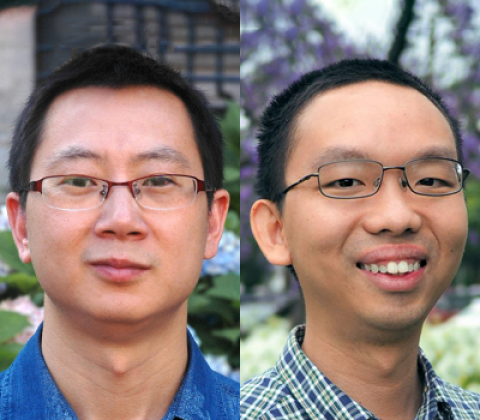Interdisciplinary Initiatives Program Round 11 - 2022
Project Investigators:
Xiaoke Chen, Biology
Xiaojing Gao, Chemical Engineering
Abstract:
Chronic pain is a pervasive global health issue affecting about 20% of individuals worldwide. Currently available treatments for chronic pain are still inadequate, in a large part because of the complex nature of chronic pain and our poor understanding of its underlying mechanism. The spinal cord is the first stop before the pain signal arrives at the central nervous system. Nerve injury or inflammation causes pain sensitization, often accompany with significant structural and functional changes in the spinal cord circuits. Therefore, a deeper understanding of the spinal cord circuits underlying chronic pain can potentially lead to better therapeutic strategies for pain management. This task faces the challenge of the complexity and diversity of neurons in the spinal cord. In our preliminary studies, we have identified subsets of spinal neurons, marked by their expression of a unique assemble of genes, as likely candidates that mediate the changes during chronic pain. However, to precisely manipulate these neurons and establish their causal roles in chronic pain, existing molecular tools are costly and time consuming. To address this technical challenge, we will leverage a novel molecular tool we’ve been developing, which enables us to express arbitrary proteins, including those that can be used to observe or alter neural activity, in specific neurons based on what genes they are producing. Furthermore, this tool allows us to circumvent the long, tedious process of creating transgenic animals, and to use straightforwardly produced viral vectors in wild type animals instead. The goals of this proposal are to use our tools to better understand the spinal cord circuits underlying chronic pain, and to use these spinal cord as a test bed to optimize the tool and demonstrate its utility. The Chen Lab are experts in examining the neural substrates of pain, and will be in charge of the animal experiments. The Gao Lab are experts in biomolecular engineering for mammalian applications, and will be in charge of tool optimization. By combining our complementary expertise, we hope to both gain deeper insights into a question critically relevant for the public health and demonstrate a tool broadly useful to the neuroscience community.



